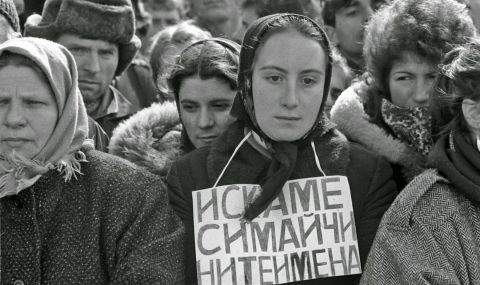On January 18, 1985, at a meeting of the Politburo of the Central Committee of the Bulgarian Communist Party with the first secretaries of the district party committees, it was reported that the names of 310,000 Bulgarian Turks had been changed so far, and for the first time there was talk of a “Revival Process“.
On December 10, 1984, by order of the Minister of the Interior Dimitar Stoyanov, the district departments of the Ministry of Internal Affairs and the first secretaries of the Central Committee of the Bulgarian Communist Party were ordered to prepare the renaming of “Bulgarian citizens of Turkish origin in all districts where there is such a population”. The campaign began at the end of December 1984. and ended in February 1985. First, personal names were changed in the Kardzhali and Haskovo districts, and then in Northeastern Bulgaria, where potential “provocateurs” had already been arrested or mobilized for military training. The scenario already worked out with the Pomaks was repeated: the settlements were blocked by the forces of order (police, troops of the Ministry of Internal Affairs, border troops) and intimidated by shooting into the air, tanks and armored personnel carriers were brought in. At the same time, the party's active and administrative machinery was operating at full speed: over the extremely short period of the campaign, the personal documents of over 800,000 people were changed. Just like with the Pomaks, the names of deceased relatives were not forgotten, and in some places Muslim cemeteries were destroyed.
At the very beginning of the “Revival Process” clashes and casualties ensued. The most massive protests were organized in Benkovski, Kardzhali, Momchilgrad, the village of Gruevo (Momchilgrad region), Djebel, Krumovgrad, etc., and were dispersed everywhere with armed force. In Yablanovo (Kotla region), locals blocked the roads to the village, which was subsequently taken over by tanks. There were also clashes in Targovishte and Shumen regions. The number of injured remains unclear, as well as the number of killed: 7 ethnic Turks, according to the "revivalists" who participated in the campaign, 24 in Southeast Bulgaria alone, according to information from the MRF. Many died later from the beatings they suffered, thousands were sent to camps and prisons, entire families were interned.
Probably for the first time the expression "revival process" was officially used by the Secretary of the Central Committee of the Bulgarian Communist Party and future Prime Minister Georgi Atanasov in a report delivered at a meeting of the party-state summit on January 18, 1985. The campaign was seen as a "historical act that erases the last trace of Turkish slavery on the strength of our people", and the renaming itself was Orwellianally called "the restoration of Bulgarian names". At the same time, the last two periodicals in Turkish were Bulgarianized, radio broadcasts in the same language were stopped, the removal of Turkish toponyms continued, etc. However, if the renaming of the Pomaks from the beginning of the 1970s was successfully hidden from the international community, the "revival process" did not remain without an echo. The situation is particularly complicated by the fact that in this case there is also a neighboring “mother state”.
The second half of the 1980s was a time of real diplomatic and propaganda war between Sofia and Ankara, although bilateral relations were not interrupted. The two countries did not miss an opportunity to denounce their neighbor at international forums such as the UN, UNESCO, the Council of Europe, and before their allies from the Warsaw Pact and NATO, respectively. While Turkey criticized the brutal violation of basic human rights in Bulgaria, the latter referred to the problem with the Kurds, the invasion of Cyprus, the Armenian genocide, etc.
Until 1989, Zhivkov's leadership expected the foreign policy situation to calm down, referring to Turkey's delicate position regarding the Kurdish resistance. But the confrontation also involved Western media and human rights organizations, which publicized the trampling of the rights of the Turkish population in Bulgaria. On top of that, the Soviet Union was also reserved, especially after Mikhail Gorbachev's "perestroika". Relations with Turkey did not normalize even after the signing of a bilateral protocol for this purpose in Belgrade (February 23, 1988). What's more: the domestic political context also became more acute, since the newly created "citizens with restored names" did not accept the thesis of their Bulgarian origin. In the period 1985-1989, dozens of illegal resistance groups of ethnic Turks were exposed. About 100 people were arrested as members of the secret organization "The Long Winter", and then - another 200 activists of the Turkish National Liberation Movement in Bulgaria.
By the beginning of 1989, Bulgarian party and state leaders began to realize that the “Revival Process” was facing failure. Despite all the measures, speaking Turkish in public places did not stop and even became demonstrative, “Bulgarians with restored names” used their birth names instead, continued to wear the usual Muslim clothing and celebrate religious holidays and rituals.
At the end of 1989, the regime of Todor Zhivkov fell.
